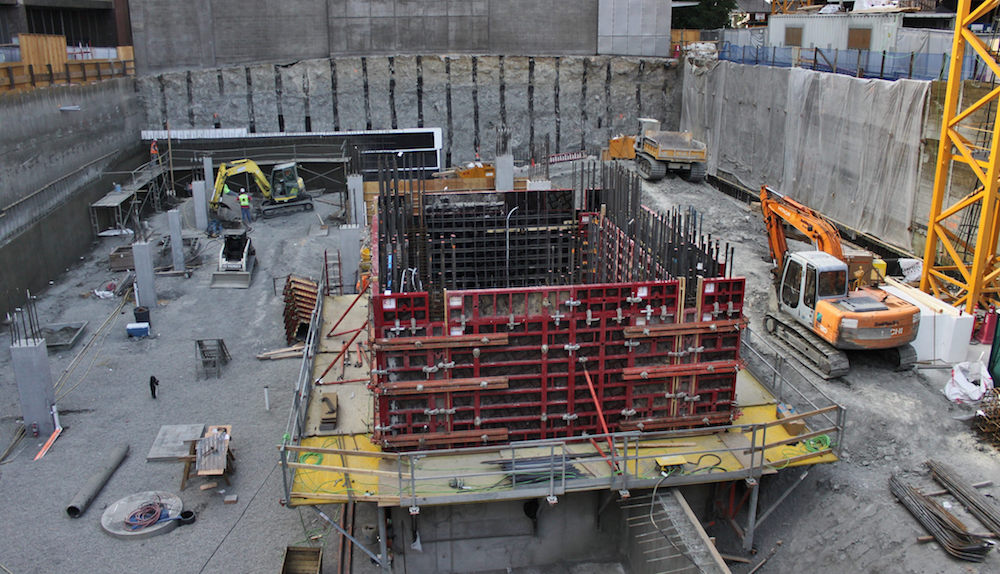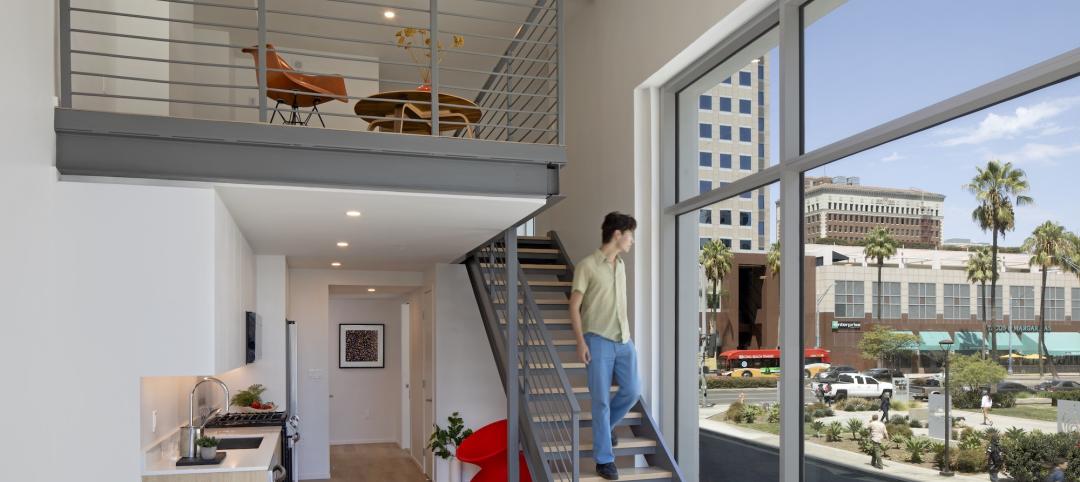A bruising presidential election and a tightening labor market are prompting reservations about future spending for nonresidential building, even as the construction industry’s performance has staved off most gloom-and-doom scenarios.
Total spending for nonresidential building was up nearly 11%, to $103.3 billion, in the first quarter. The Census Bureau estimated that the value of nonresidential building put in place rose 3.1% in April compared to April 2015, to an annualized $461.8 billion, spurred by robust building of hotels, offices, and entertainment/amusement centers.
TOP CONTRACTOR GIANTS
2015 GC Revenue ($)
1. Turner Construction Co. $10,566,643,175
2. Whiting-Turner Contracting Co. $5,530,003,229
3. Fluor Corp. $5,048,920,000
4. Skanska USA $4,887,571,264
5. Gilbane Building Co. $4,406,057,000
6. PCL Construction Enterprises $4,344,294,460
7. Balfour Beatty US $3,955,770,283
8. Structure Tone $3,865,600,000
9. AECOM $3,772,057,000
10. DPR Construction $3,085,975,000
TOP CM/PM GIANTS
2015 CM/PM Revenue ($)
1. Hill International $503,000,000
2. Jacobs $460,670,000
3. JLL $328,233,760
4. Hunter Roberts Construction Group $259,724,915
5. AECOM $256,933,000
6. Burns & McDonnell $255,390,861
7. WSP | Parsons Brinckerhoff $173,063,000
8. Turner Construction Co. $161,788,824
9. Sachse Construction $109,836,555
10. Cumming $96,538,000
CONSTRUCTION GIANTS SPONSORED BY:
“The construction sector is likely to be the economic tailwind” in the U.S., predicts Kermit Baker, PhD, Chief Economist with the American Institute of Architects.
Baker and chief economists Ken Simonson of the Associated General Contractors of America and Alex Carrick of CMD Construction Data expect nonresidential construction spending to increase 9–10% this year and 4–8% in 2017. More than one-third of AGC’s membership expects there will be more work to bid on this year than last year, particularly in the retail, warehouse, lodging, and office sectors.
The trio of economists raised a number of red flags about factors that could slow construction spending. “Market fundamentals remain positive, but are fading in most sectors,” said Baker.
Carrick and Simonson are less sanguine about spending for education-related projects, mainly because growth figures for 4- to 17-year-olds and 18- to 26-year-olds are either flat lining or receding.
Simonson noted that recent legislation passed by Congress extends tax credits and allows for more federal dollars to flow into construction. But the federal government is reducing its overall physical footprint, so it’s more likely to renovate existing buildings than build new.
Multifamily housing, which has been one of the construction industry’s high-powered turbines—it’s up 30% since 2009, according to Baker—is expected to taper off to a still-strong but normalized range of 410,000–440,000 units per year.
Simonson also pointed out that the U.S. population has been growing at less than 1% annually, and that several states have lost population. Immigration, which has pushed population growth over the past few decades, has lost traction. The factors could lead to less mobility and less demand for new construction.
HELLO!!! ARE THERE ANY CARPENTERS OUT THERE?
Another area of concern for contractors is finding the skilled labor they need to complete projects they bid for.
The country’s unemployment rate stood at 4.7% in May, and was down in 269 of 387 metros, according to Bureau of Labor Statistics estimates. Carrick noted that the labor participation rate (the labor force as a percentage of the working-age population) fell to 62.5% in Q1/2016, from 67% in 2001.
Citing a recent survey of 1,300 AGC-member companies, Simonson said that 79% are having difficulty finding hourly craft professionals, and 73% struggle to hire carpenters. More than half (56%) said they have raised their base pay for hourly workers; 29% provide incentives and bonuses.
None of the economists anticipates a recession rearing its head any time soon. “I think there’s too much negative talk about the economy,” said Carrick. What does worry him are the sluggish energy sector and economic slowdowns outside the U.S., specifically China.
As for the presidential race, AGC’s Simonson lamented that it might not make much difference who wins. “I expect continued gridlock,” he says. “Uncertainty will cause companies to hold back on major investments.”
More on the 2016 Construction Giants: BD+C's John Caulfield examines how Turner uses to design-build, P3, Lean practices, and engineering services.
RETURN TO THE GIANTS 300 LANDING PAGE
Related Stories
Concrete | Jan 24, 2023
Researchers investigate ancient Roman concrete to make durable, lower carbon mortar
Researchers have turned to an ancient Roman concrete recipe to develop more durable concrete that lasts for centuries and can potentially reduce the carbon impact of the built environment.
Architects | Jan 23, 2023
PSMJ report: The fed’s wrecking ball is hitting the private construction sector
Inflation may be starting to show some signs of cooling, but the Fed isn’t backing down anytime soon and the impact is becoming more noticeable in the architecture, engineering, and construction (A/E/C) space. The overall A/E/C outlook continues a downward trend and this is driven largely by the freefall happening in key private-sector markets.
Multifamily Housing | Jan 23, 2023
Long Beach, Calif., office tower converted to market rate multifamily housing
A project to convert an underperforming mid-century office tower in Long Beach, Calif., created badly needed market rate housing with a significantly lowered carbon footprint. The adaptive reuse project, composed of 203,177 sf including parking, created 106 apartment units out of a Class B office building that had been vacant for about 10 years.
Hotel Facilities | Jan 23, 2023
U.S. hotel construction pipeline up 14% to close out 2022
At the end of 2022’s fourth quarter, the U.S. construction pipeline was up 14% by projects and 12% by rooms year-over-year, according to Lodging Econometrics.
Standards | Jan 19, 2023
Fenestration Alliance updates liquid applied flashing standard
The Fenestration and Glazing Industry Alliance (FGIA) published an update to its Liquid Applied Flashing Standard. The document contains minimum performance requirements for liquid applied flashing used to provide water-resistive seals around exterior wall openings in buildings.
AEC Tech | Jan 19, 2023
Data-informed design, with Josh Fritz of LEO A DALY
Joshua Fritz, Leo A Daly's first Data Scientist, discusses how information analysis can improve building project outcomes.
Multifamily Housing | Jan 19, 2023
Chicago multifamily high-rise inspired by industrial infrastructure and L tracks
The recently unveiled design of The Row Fulton Market, a new Chicago high-rise residential building, draws inspiration from industrial infrastructure and L tracks in the historic Fulton Market District neighborhood. The 43-story, 300-unit rental property is in the city’s former meatpacking district, and its glass-and-steel façade reflects the arched support beams of the L tracks.
Products and Materials | Jan 18, 2023
Is inflation easing? Construction input prices drop 2.7% in December 2022
Softwood lumber and steel mill products saw the biggest decline among building construction materials, according to the latest U.S. Bureau of Labor Statistics’ Producer Price Index.
ProConnect Events | Jan 17, 2023
3 ProConnect Single Family events for Home Builders and Product Manufacturers set for 2023
SGC Horizon, parent company of ProBuilder, will present 3 ProConnect Single Family Events this year. At ProConnect Single Family, Home Builders meet in confidential 20-minute sessions with Building Product Manufacturers to discuss upcoming projects, learn about new products, and discover practical solutions to technical problems.
University Buildings | Jan 17, 2023
Texas Christian University breaks ground on medical school for Dallas-Fort Worth region
Texas Christian University (TCU) has broken ground on the Anne Burnett Marion School of Medicine, which aims to help meet the expanding medical needs of the growing Dallas-Fort Worth region.


















